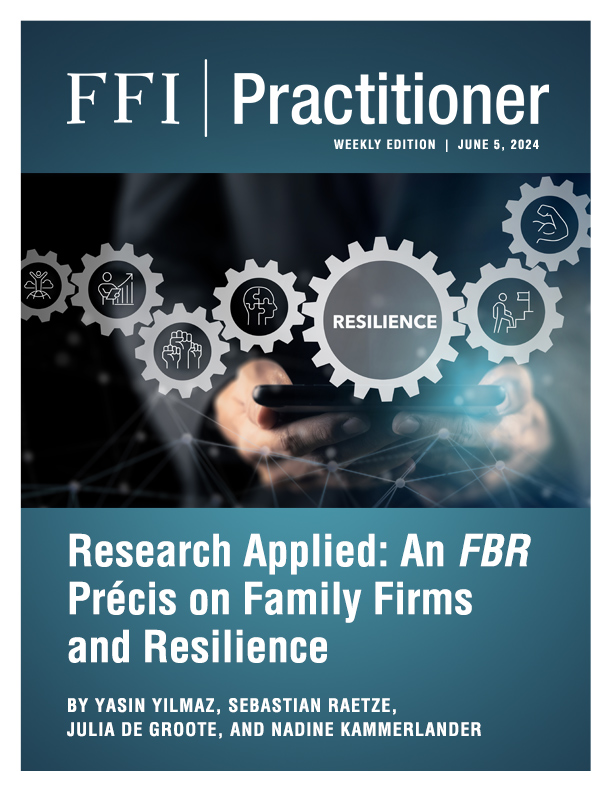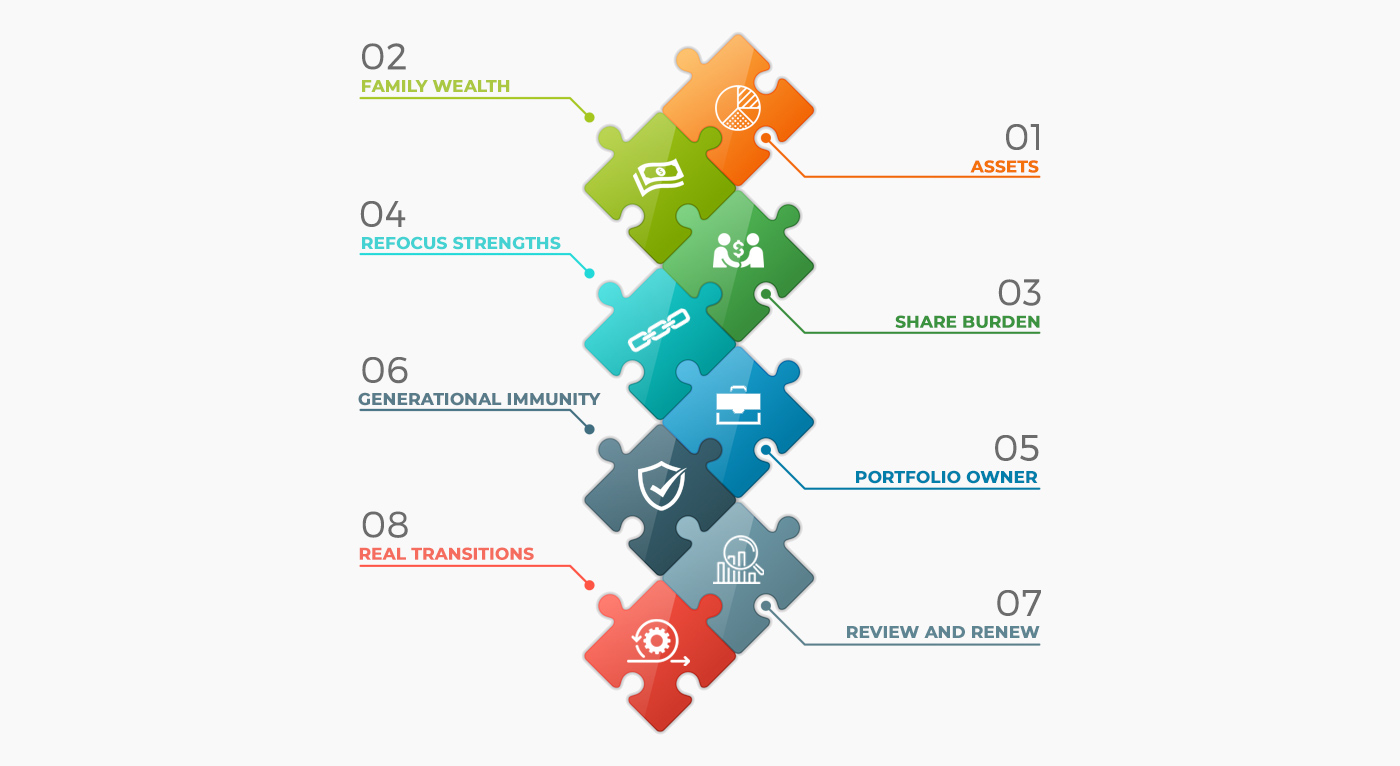
Introduction
It is well understood that the unpredictable nature of all manner of global crises affect everyone, from individuals to families to corporations. However, family enterprise advisors are also aware that family-owned enterprises face a dual burden during these uncertain times. They not only grapple with the external adversities shared by all businesses but also contend with internal dynamics unique to their special organizational form (Tsoutsoura 2021). Internal conflicts, succession issues, and role ambiguities frequently plague these enterprises (De Massis et al. 2018; Harvey and Evans 1994; Morris et al. 1997; Schmidts 2013; Soluk et al. 2021). Consequently, family businesses require increased resilience to weather such storms effectively. Interestingly, previous research on family businesses indicates that they often demonstrate remarkable resilience (Azouz et al. 2022; Chrisman et al. 2011), even surpassing non-family enterprises (Amann and Jaussaud 2012; Ding et al. 2021; Eckey and Memmel 2022).
This raised a question for the research team behind the FBR article, “Resilience in Family Businesses: A Systematic Literature Review”:
According to existing research into enterprising families, how can family businesses exhibit resilience despite facing numerous and unique challenges?
Findings and Implications for Practice
Defining and Measuring Resilience
The authors analyzed dozens of articles across fourteen years of research into family enterprise resilience, which they defined as “the process of positive individual, family/non-family group, and organizational adjustment to persistent stressors and discontinuous events, supported by idiosyncratic resource endowments, leading to the functional and structural integrity and functioning of the family business in the short term and to family business longevity in the long term” (Yilmaz et al. 2024, 68).
The literature review showed that family businesses have a higher degree of resilience compared to non-family businesses. This resilience was often evidenced through direct comparisons of financial indicators before and after crises (for example, the return on investments after a natural disaster). The resilience of family businesses is derived from the distinctiveness of their resources, underscoring the importance for family business practitioners to cultivate and safeguard these characteristics:
- Long-term orientation and family values
- Sustained social capital
- Capacity for strategic renewal
Long-Term View and Family Values
The underlying driver of this resilience primarily stems from the long-term orientation and deep-rooted family values characteristic of family businesses. The literature indicates that family enterprises are strengthened when they can effectively leverage these qualities. If advisors encourage their clients to incorporate this long-term orientation and family values into all aspects of their decision-making, strategic initiatives, resource allocations, and operational ethos, then it is likely to help those firms persevere through adverse and crisis-laden periods. This intrinsic motivation and passion set family businesses apart from non-family enterprises—which are often more likely to prioritize short-term gain (Miller et al. 2008)—instilling a resilience that endures amidst adversity.
Furthermore, studies indicate that the long-term focus inherent in family businesses promotes knowledge exchange, intergenerational learning, and the development of firm-specific practices to identify opportunities, all of which contribute to enhancing resilience (Conz et al. 2020).
While family businesses are often perceived as having more limited financial resources than their non-family counterparts (De Massis et al. 2018), the research team’s findings suggest that they possess increased patient financial capital (Campopiano et al. 2019; Mzid, 2017; Sirmon and Hitt 2003), serving as a buffer or reserve to help the businesses weather turbulent times. In addition to supporting financial capital, long-term orientation also fosters the development and maintenance of robust social capital within family businesses.
Sustained Social Capital
Social capital has emerged as a pivotal factor in promoting resilience (Amaral and Da Rocha 2023), facilitating advantageous information exchange (Alonso and Kok 2021), and bolstering connections with financial institutions (Mahto et al. 2022). These robust social networks enable family businesses to secure vital support, such as loan extensions or additional financing, even in challenging times. Importantly, amidst crises, these social networks offer invaluable opportunities for learning from others and adeptly adjusting to evolving circumstances.
The authors recommend that family enterprise practitioners should increase their attention to helping their clients to develop their social capital. Individual exchanges within familial and professional circles nurture personal resilience, while broader interactions with business partners, suppliers, and customers fortify resilience at the organizational level.
Moreover, the pivotal role of the owner-manager—the nexus of ownership and management—becomes evident, with their actions and decisions exerting profound influence over the trajectory of the family business during crises.
Capacity for Strategic Renewal
Another key resource identified in family businesses is the capacity for strategic renewal, synonymous with the ability to innovate. Proactive resilience strategies enable family businesses to mitigate risks and pivot to alternative approaches when conventional methods fail in times of crisis. By mobilizing and leveraging these resources and capabilities, family businesses effectively demonstrate resilience, seizing opportunities for learning and growth in the process. These adaptive processes not only ensure the short-term survival of both the family and the business but also contribute to the longevity of the family enterprise in the long run. With increasing experience, the pool of resources and capacities expands, strengthening the resilience of the family business and increasing its prospects for sustainable success. Finally, diversification emerges as a strategic imperative for family businesses, offering avenues to mitigate risk and enhance resilience in an ever-changing business landscape.
Sidebar

Methodology
These findings were supported by using a systematic literature review (Tranfield et al., 2003), the authors analyzed and systematically categorized 87 articles published in peer-reviewed journals between 2009 and 2023. The selection criteria encompassed articles that centrally focused on resilience in the context of family businesses and constituted full-length conceptual or empirical studies. Upon completion of the search process, the authors analyzed and categorized all articles within our dataset. Four pivotal themes emerged from the literature:
- Defining family business resilience
- Long-term orientation and family values
- Resource and capability endowments
- Demonstration of resilience and learning
A Framework to Consider: Sustainable Family Business Theory
Despite the general lack of theoretical underpinnings in the family business resilience literature, one theory emerges as prominently featured and considered in thirteen instances: the Sustainable Family Business Theory (SFBT). This theory, formulated by Danes et al. (2009), places emphasis on the sustainability of family businesses, achieved through the intertwining dynamics of short-term business viability and family functionality. SFBT highlights the complex relationship between family and business systems, particularly focusing on their interface where disruptions occur, resources are allocated, and roles are negotiated. According to the theory, any imbalance, characterized by the disproportionate allocation of resources within one system, jeopardizes the integrity of the other system, ultimately leading to its failure. The Sustainable Family Business Theory, as highlighted by the research analyzed in this literature review, underscores that it is crucial for both family advisors and their clients to recognize the need to support both the family system and the business system if the business is to be resilient enough to persevere through generations.
Conclusion
The research gathered and considered in “Resilience in Family Businesses: A Systematic Literature Review” indicates that some of the most salient characteristics of family enterprises are in fact their unique strengths: their focus on the long term, their emphasis on the family’s values, and their robust social capital. The authors also found that a dynamic owner-manager and a capacity for strategic renewal both contribute to a family firm’s resilience. While theoretical frameworks were not commonly applied to family business resilience research, the theory that emerged most often was Sustainable Family Business Theory, which focuses on the importance of balancing support and resources across both the family system and the business system. Advisors who can help their client families maintain balance on both sides of the scale will also be contributing to their long-term resilience.
References
Amaral, Priscila C. F., and Angela Da Rocha. “Building Resilience during the Covid-19 Pandemic: The Journey of a Small Entrepreneurial Family Firm in Brazil.” Journal of Family Business Management 13, no. 1 (2023): 210–225, https://doi.org/10.1108/JFBM-02-2022-0017.
Anggadwita, Grisna, Anggraeni Permatasari, Dini T. Alamanda, & Werda B. Profityo. “Exploring Women’s Initiatives for Family Business Resilience during the COVID-19 Pandemic. Journal of Family Business Management 13, no. 3 (2022): 714-736, https://doi.org/10.1108/JFBM-02-2022-0014.
Azouz, Ali, Nicolas Antheaume, and Brigitte Charles-Pauvers. “Looking at the Sky: An Ethnographic Study of How Religiosity Influences Business Family Resilience.” Family Business Review 35, no. 2 (2022): 184–208, https://doi.org/10.1177/08944865221095323.
Campopiano, Giovanna, Alfredo De Massis, and Josip Kotlar. “Environmental Jolts, Family-Centered Non-economic Goals, and Innovation: A Framework of Family Firm Resilience.” In The Palgrave Handbook of Heterogeneity among Family Firms, edited by Esra Memili and Clay Dibrell, 773–789. London: Palgrave Macmillan, 2019, https://doi.org/10.1007/978-3-319-77676-7_28.
Chrisman, James J., Jess H. Chua, and Lloyd P. Steier. “Resilience of Family Firms: An Introduction,” Entrepreneurship Theory and Practice 35, no. 6 (2011): 1107–1119, https://doi.org/10.1111/j.1540-6520.2011.00493.x.
Conz, Eliza, Peter W. Lamb, and Alfredo De Massis. “Practicing Resilience in Family Firms: An Investigation through Phenomenography.” Journal of Family Business Strategy 11, no. 2 (2020): 100355, https://doi.org/10.1016/j.jfbs.2020.100355.
Crespo, Nuno F., Cátia F. Crespo, and Maria Calado. “Strategic Responses of the Family Businesses in Accommodation Industry: Lessons for Overcoming Crises.” Journal of Family Business Management 13, no. 1 (2023): 118–145, https://doi.org/10.1108/JFBM-03-2022-0045.
Danes, Sharon M., Jinhee Lee, Sayali Amarapurkar, Kathryn Stafford, George Haynes, and Katherine E. Brewton. “Determinants of Family Business Resilience after a Natural Disaster by Gender of Business Owner.” Journal of Developmental Entrepreneurship 14, no. 04 (2009): 333–354, https://doi.org/10.1142/S1084946709001351.
De Massis, Alfredo, David Audretsch, Lorraine Uhlaner, and Nadine Kammerlander. “Innovation with Limited Resources: Management Lessons from the German Mittelstand,” Journal of Product Innovation Management 35, no. 1 (2018): 125–146, https://doi.org/10.1111/jpim.12373.
Ding, Wenzhi, Ross Levine, Chen Lin, and Wensi Xie. “Corporate Immunity to the COVID-19 Pandemic,” Journal of Financial Economics 141, no. 2 (2021): 802–830, https://doi.org/10.1016/j.jfineco.2021.03.005.
Discua Cruz, Allan, Rodrigo Basco, Maria José Parada, Antonio Malfense Fierro, and Cristina Alvarado-Alvarez. “Resilience and Family Business Groups in Unstable Economies.” In The Family Business Group Phenomenon, edited by Marita Rautiainen, Peter Rosa, Timo Pihkala, Maria José Parada, and Allan Discua Cruz, 315–352. London: Palgrave Macmillan, 2019.
Duarte Alonso, Abel, and Seng Kok. “Knowledge and the Family Firm through Generations: A Knowledge-Based Approach in Various Geographic Contexts.” Knowledge Management Research & Practice 19, no. 2 (2021): 239–252, https://doi.org/10.1080/14778238.2020.1762254.
Eckey, Markus, and Sebastian Memmel. “Impact of COVID-19 on Family Business Performance: Evidence from Listed Companies in Germany.” Journal of Family Business Management 13, no. 3 (2022): 780-797, https://doi.org/10.1108/JFBM-11-2021-0143.
Fischer-Kreer, Denise, Andrea Greven, Isabel C. Eichwald, David Bendig, and Malte Brettel. “Organizational Psychological Capital in Family Firms: The Role of Family Firm Heterogeneity.” Schmalenbach Journal of Business Research 73, no. 3 (2021): 413–441, https://doi.org/10.1007/s41471-021-00124-6.
Harvey, Michael, and Rodney E. Evans. “Family Business and Multiple Levels of Conflict,” Family Business Review 7, no. 4 (1994): 331–348, https://doi.org/10.1111/j.1741-6248.1994.00331.x.
Mahto Raj V., Orlando Llanos-Contreras O, and Melany Hebles. “Post-Disaster Recovery for Family Firms: The Role of Owner Motivations, Firm Resources, and Dynamic Capabilities.” Journal of Business Research 145 (2022): 117–129, https://doi.org/10.1016/j.jbusres.2022.02.089.
Miller, Danny, Isabel Le Breton-Miller, Barry Scholnick. “Stewardship vs. Stagnation: An Empirical Comparison of Small Family and Non-family Businesses.” Journal of Management Studies 45, no. 1 (2008): 51–78, https://doi.org/10.1111/j.1467-6486.2007.00718.x.
Morris, Michael H., Roy O. Williams, Jeffrey A. Allen, and Ramon A. Avila. “Correlates of Success in Family Business Transitions,” Journal of Business Venturing 12, no. 5 (1997): 385–401, https://doi.org/10.1016/S0883-9026(97)00010-4.
Mzid, Imen. “Family Capital and Organizational Resilience of the Family Firm in Tunisia.” In Family Businesses in the Arab World, edited by Sami Basly, 41–61. Cham: Springer, 2017.
Schmidts, Torsten. “Social Identity Theory and the Family Business: A Contribution to Understanding Family Business Dynamics,” Small Enterprise Research 20, no. 2 (2013): 76–86, https://doi.org/10.5172/ser.2013.20.2.76.
Sirmon, David G., and Michael A. Hitt. “Managing Resources: Linking Unique Resources, Management, and Wealth Creation in Family Firms.” Entrepreneurship Theory and Practice 27, no. 4 (2003): 339–358, https://doi.org/10.1111/1540-8520.t01-1-00013.
Soluk, Jonas, Nadine Kammerlander, and Alfredo De Massis, A. “Exogenous shocks and the adaptive capacity of family firms: Exploring Behavioral Changes and Digital Technologies in the COVID-19 Pandemic.” R&D Management 51, no. 4 (2021): 364–380, https://doi.org/10.1111/radm.12471.
Tranfield, David, David Denyer, and Palminder Smart. “Towards a Methodology for Developing Evidence-Informed Management Knowledge by means of Systematic Review.” British Journal of Management 14, no. 3 (2003): 207–222, https://doi.org/10.1111/1467-8551.00375.
Tsoutsoura, Margarita. “Family Firms and Management Practices,” Oxford Review of Economic Policy 37, no. 2 (2021): 323–334, https://doi.org/10.1093/oxrep/grab005.
Yilmaz, Yasin, Sebasian Raetze, Julia de Groote, and Nadine Kammerlander. “Resilience in Family Businesses: A Systematic Literature Review.” Family Business Review 37, no. 1 (2024): 60-88, https://doi.org/10.1177/08944865231223372.







